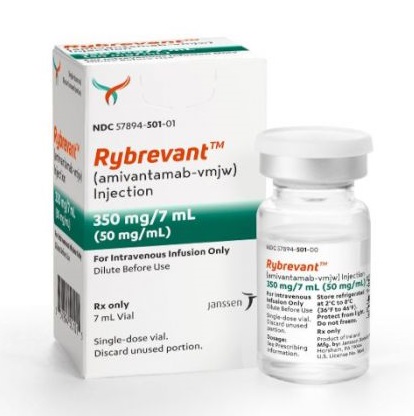Janssen’s Rybrevant (ingredient: amivantamab) obtained marketing approval for the treatment of non-small cell lung cancer (NSCLC) with epidermal growth factor receptor (EGFR) exon 20 insertion mutations in Korea.
On Tuesday, the Ministry of Food and Drug Safety (MFDS) approved Rybrevant to treat patients with locally advanced or metastatic NSCLC with EGFR exon 20 insertion mutations whose disease progressed during or after platinum-based chemotherapy.

Rybrevant is the first fully human, bispecific antibody authorized for NSCLC targeting EGFR exon 20 insertion mutations.
EGFR exon 20 insertion mutations are the third most prevalent EGFR mutations, following exon 19 deletion and exon 21 L858R point substitution.
However, existing EGFR tyrosine kinase inhibitors (TKIs) showed low response rates or zero to 9 percent in the treatment of NSCLC with exon 20 insertion mutations.
Thus, physicians have used platinum-based chemotherapy as the standard treatment in this area, where the overall survival is only about 16 months with a very poor prognosis.
The latest approval for Rybrevant was based on the results from a phase 1 CHRYSALIS study, which evaluated the safety and efficacy of the drug in locally advanced or metastatic NSCLC.
CHRYSALIS included 81 patients with locally advanced or metastatic NSCLC with EGFR exon 20 insertion mutations whose disease progressed during or after platinum-based chemotherapy.
For the first four weeks, Rybrevant 1050 mg was administered to patients weighing less than 80 kg and 1400 mg to those weighing 80 kg or more intravenously. After that, the drug was given once every two weeks until disease progression or occurrence of unacceptable toxicity from week five.
During the median 9.7 months of follow-up, the overall response rate (ORR) in the Rybrevant monotherapy group was 40 percent, and 4 percent of the patients achieved complete response (CR) and 36 percent partial response (PR).
The median duration of response (DoR) was 11 months, and the median progression-free survival (PFS) was 8.3 months.
The most common adverse events in the Rybrevant group included rash, infusion-related reactions (IRR), paronychia, and musculoskeletal pain.
Korean researchers led Rybrevant development from early-stage clinical trials, and 49 percent of the CHRYSALIS study participants were Asians, which reportedly contributed to fast approval by the MFDS.
Professor Cho Byoung-chul at Yonsei Cancer Center, one of the leading researchers in Rybrevant development, said the latest approval in Korea was significant for both physicians and NSCLC patients with EGFR exon 20 insertion mutations who suffered from the lack of treatment options.
“I expect Rybrevant will improve the treatment outcome of NSCLC patients with EGFR exon 20 insertion mutations who used to have a poor prognosis,” he said.
(Caption)
Janssen’s Rybrevant won the license to treat non-small cell lung cancer with EGFR exon 20 insertion mutations in Korea.

